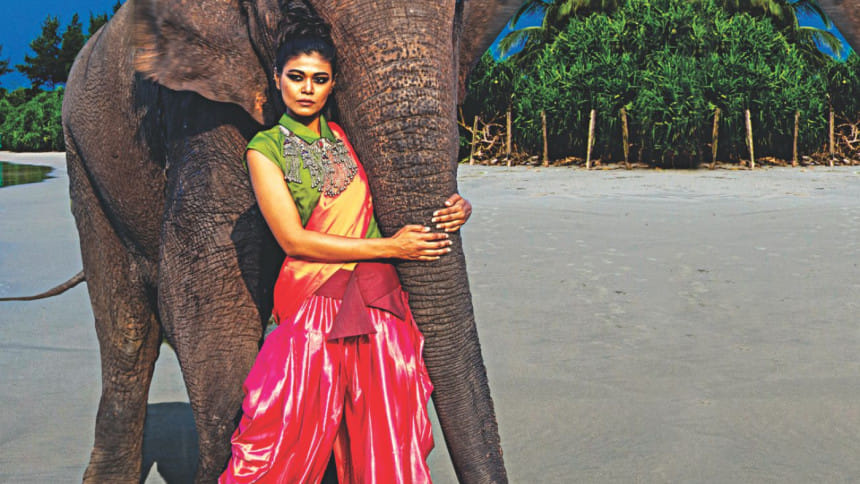The elephant in the Room

An elephant's tale
When people call this beast to mind,
They marvel more and more
At such a little tail behind,
So large a trunk before.
--Hillaire Beloc
An animal in all its grandiosity, yet so calm and gentle. They travel in herds and exhibit incredible intelligence; they say elephants never forget, from which, the phrase "elephant's memory" was coined. But that is only one aspect of what makes these beings the most social, creative and compassionate creatures to walk this Earth.
Yet, what has today's world come to? Do we always treat them right? It is the many qualities of an elephant that need to be emulated in today's world of violence and bloodshed. For what is human if we do not show compassion and generosity to those lesser than us?

It seems like the most 'natural' and obvious way to spend time with an elephant for those who are under the pretence that these gentle, large, majestic beings have been 'freed' from a life of extortion and forced labour.
But what is natural for an elephant is to spend their days playing, swimming, rummaging, and exploring through its own habitat and interacting with its own kind in herds. On a daily basis, they can walk up to 50 kilometres and remain active for about 18 hours.
Sadly, as tourists, the moment we agree to be a part of such practices, not only are we still putting these animals into harm's way, but promoting practices that are frowned upon.
When you see an elephant on the big streets, alleys, grand weddings, the first being in its closest proximity is a mahout, often seen riding it; a person, who knows this powerful yet calm beast like no other, a bond shared between man and animal that can only be broken by death itself.
In his expert hands lie tools that allows him to control and 'guide' the animal to reduce risks and ensure protection of those around it. Regardless of the consequences, these majestic creatures are compelled to submit to the mahout's every wish; ignoring their innate, instinctive needs.
Elsewhere, elephants are forced into painful, undeserving, and unnecessary forms of punishment that lead to prolonged, unspeakable physical and mental anguish. But all we see is the elephant balancing itself on its head or cycle in circles, a resultant of the trainer's terrible role and intensity of gruesome training and sufferings the elephant was put through to perform such 'unnatural' gimmicks, all for a few laughs, cheers and applause from the audience.
There are a number of alternative ways to share experiences with these animals without inflicting or propagating further cruelty on them. Do your research before visiting an elephant camp to first understand their philosophy and treatment towards animals. Support accredited sanctuaries and organisations that work for the welfare of these animals that are an auspicious symbol of good luck.
Visit the elephant sanctuary in Chitwan, Nepal, which works to support and conserve endangered rhinos and Bengal tigers, and also offers walks with elephants. The encounter is one of a kind, if not respectful to the great giant and nature itself; almost like walking in its large sized shoes, as you follow them on their way to the river, where they bathe and enjoy swimming.
The experience itself is truly calming, self-awakening as you interact in the most natural way possible for an elephant living in captivity.
Be it visiting elephant sanctuaries or petting your household dog, a heartfelt interaction with animals — our fellow inhabitants on Planet Earth — creates a sense of compassion and bonding, perhaps from both sides.
It makes one realise that we human beings are not alone here, that we are indeed all just temporary citizens of the world, and that we are meant to live in harmony, without causing distress to one another.
But alas! What do we see instead?
In recent times, photos of elephants dying on fences or lit on fire have surfed the Internet; while many stand to justify these as ways to protect human settlements, or their own agro-livelihoods, we often forget that we do so on land snatched and levelled, which they once recognised as home; before it was chopped, cut and stripped in the name of progress and growth.
The result of such atrocities has only led to more violence and sufferings in the world. While mother earth withers away, so do all her creatures, impacted by the rising temperatures and the abnormal symptoms of weather changes.
The reality is that there is no Captain Planet coming to the rescue. It is up to us to respect and protect animals and the ecosystems we all live in.
If people remain engrossed in short-termism and greed, the wrath of Mother Nature will continue to rise.
And we — and all other creatures that have never been a part of this havoc — ourselves are on the receiving end of it.
Somewhere down the line, we erased all notions of kindness and compassion, for not just these intelligent, sentient pachyderms, but all others that have no voice against the barbarity that we as humans have inflicted upon them; inadvertently sealing our own fates of demise in the process, as the words 'survival of the fittest' echo through the hot, polluted winds.
Photo: Sazzad Ibne Sayed
Model: Joly
Wardrobe: LS Desk
Styling: Sonia Yeasmin Isha
Make-up: Farzana Shakil's Makeover Salon
DISCLAIMER: No animal was hurt or treated in a cruel manner during the photoshoot used in today's feature. The Daily Star adheres to the provisions of the Cruelty to Animals Act, 1920 and pledges its support for the animal rights under the applicable laws and legal instruments.
Corrigendum:
In the print version of this write-up, the name was mistakenly put as M. H. Sarkar. It was an unintended mistake and Star Lifestyle apologises for any grievances caused. The online version has been corrected accordingly.






Comments